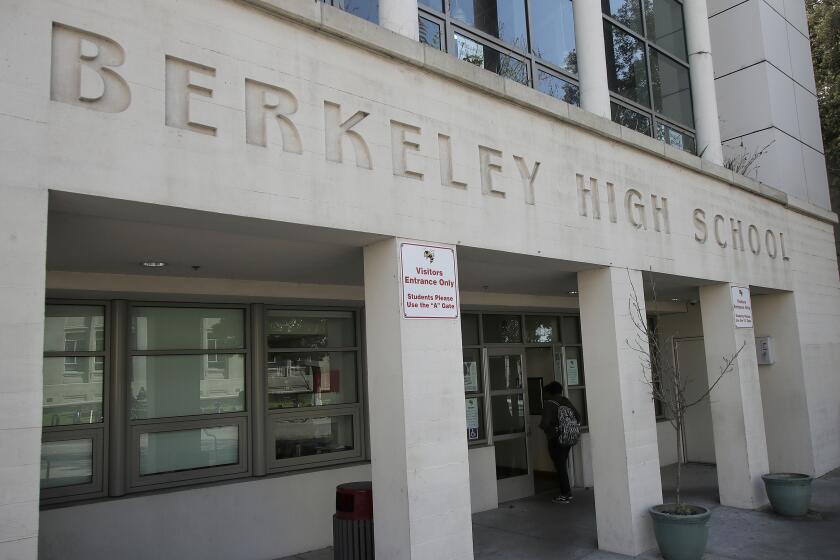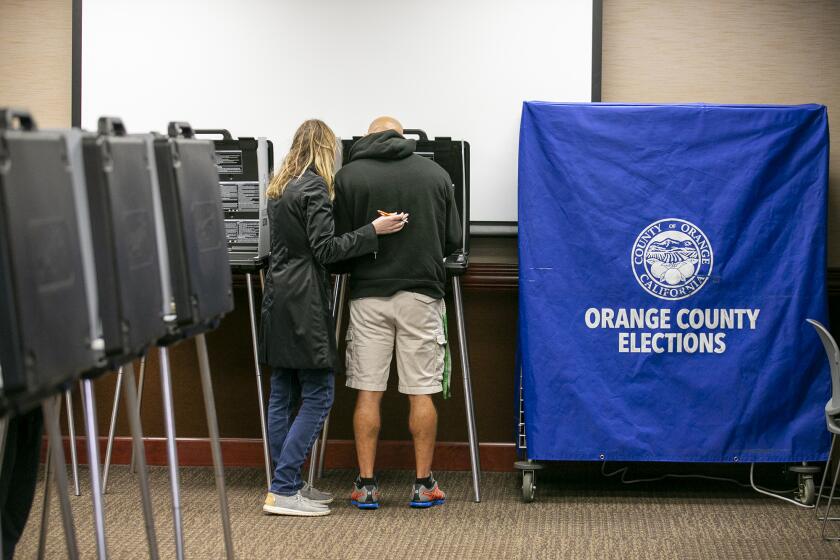Pay-TV Bill OKd by State Senate
Shrugging off objections from cities and counties, the state Senate late Wednesday voted 33 to 4 to approve a measure that takes oversight of pay television away from local governments and consolidates control with California regulators.
The bill, which Gov. Arnold Schwarzenegger is expected to sign as early as today, is intended to make it easier for big phone companies to compete against big cable companies to provide TV services.
Backed by Assembly Speaker Fabian Nunez (D-Los Angeles), the bill is supported by phone and cable companies that have had to secure approval from each municipality in which they offer programming. They complain that local officials make unreasonable demands and take too long to approve agreements.
If more than 300 changes to the bill pass muster with the Assembly, the legislation would make California the eighth state to streamline its franchising rules. California would invest the Public Utilities Commission with the authority to grant pay-TV franchises statewide, beginning no later than April 1.
Cities and counties would retain the power to enforce service agreements and would continue to get a 5% cut of cable revenue. Some local workers could lose their jobs as franchising authority moves to the state. The utilities commission, meanwhile, probably would hire as many as 200 new employees at a cost of as much as $3 million a year, paid by the companies regulated.
AT&T; Inc., California’s dominant phone company, would be the biggest beneficiary of the legislation. California is the largest TV market in the nation -- and home to one-third of all the residential phone lines in AT&T;’s 13-state territory.
“Today is a great day for California consumers, who are now one step closer to having a real choice for their TV/video service,” said Kenneth P. McNeely, Western region president for San Antonio-based AT&T.; “Today’s Senate vote reaffirms that both Democrats and Republicans alike support the benefits of video competition -- consumer cost savings, private investment in the state’s broadband infrastructure and thousands of new jobs for California.”
The bill would “ensure Californians get the best deal possible for video service,” said Timothy J. McCallion, Western region president for New York-based Verizon Communications Inc., the state’s second-largest carrier. It also would accelerate Verizon’s efforts to build a high-capacity fiber optic network in California to deliver TV programming, he said.
Cities and counties say the measure, although strengthened with numerous safeguards, remains weak on requirements to build fiber optic networks throughout communities and to ensure that phone companies don’t bypass poor areas.
“This is a very complicated bill, and it’s outrageous that all these amendments were made in the last days and we never were allowed to see them,” said Megan Taylor, spokeswoman for the League of California Cities.
The bill would keep intact a 5% fee that municipalities get from cable TV revenue for using public rights of way. But local officials worry that it would allow the state in a financial crisis to take away that revenue, estimated at $300 million statewide.
Pasadena spokeswoman Ann Erdman said that because the bill would leave the city’s enforcement structure in place, no layoffs among its more than 100 information technology workers were expected.
In Los Angeles, workers in the cable television franchise administration were concerned about the bill’s ramifications, said Stacy Burnette, a supervisor. But she and city spokeswoman Janelle Erickson would not comment further on possible effects.
Opposition from cable TV companies evaporated two months ago when a Senate subcommittee amended the bill to allow them to escape key local contract provisions and opt into the state system once phone company competition arrives.
AT&T; and Verizon lobbied heavily for the measure, AB 2987. AT&T; spent nearly $18 million in lobbying efforts and donated $500,000 to political campaigns, according to the Foundation for Taxpayer and Consumer Rights.
The carriers controlled the process so thoroughly, Taylor said, that “on amendments we would send over to the Legislature, we’d hear back, ‘Sorry, but AT&T; said no.’ ”
The phone companies, meanwhile, are pushing other states for similar legislation and lobbying Congress for a federal franchising law.
To provide television programming, phone companies are upgrading their networks with high-capacity fiber lines. AT&T; is using existing copper wire as well as fiber to roll out service faster; Verizon is taking fiber to the home, a slower and more expensive process but one that will make it better able to compete with cable.
More to Read
Get the L.A. Times Politics newsletter
Deeply reported insights into legislation, politics and policy from Sacramento, Washington and beyond. In your inbox three times per week.
You may occasionally receive promotional content from the Los Angeles Times.






